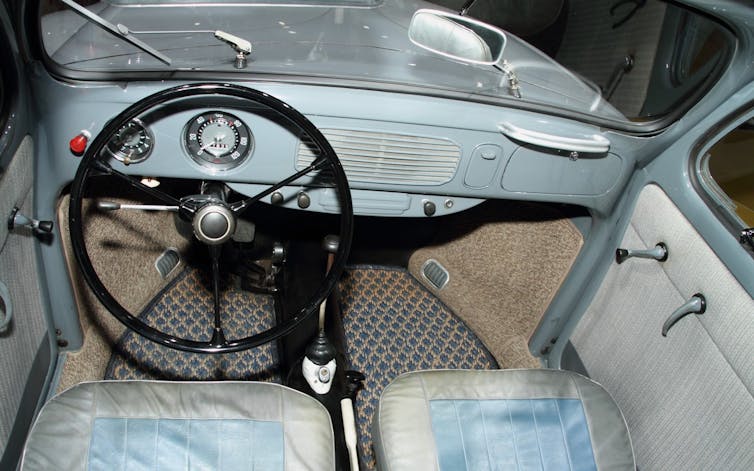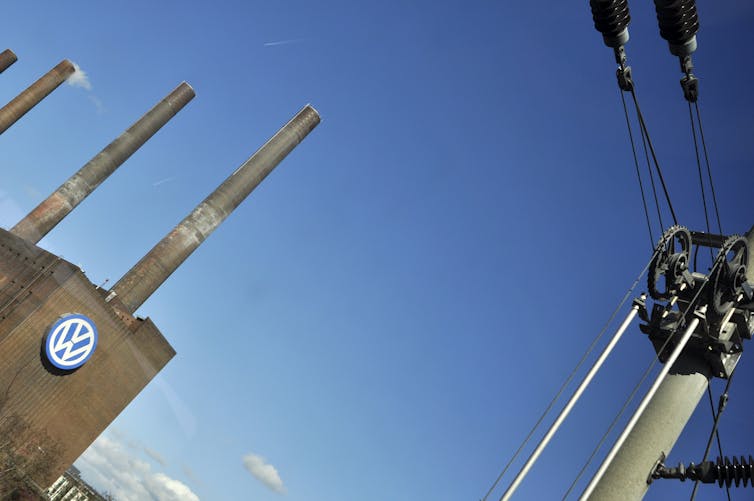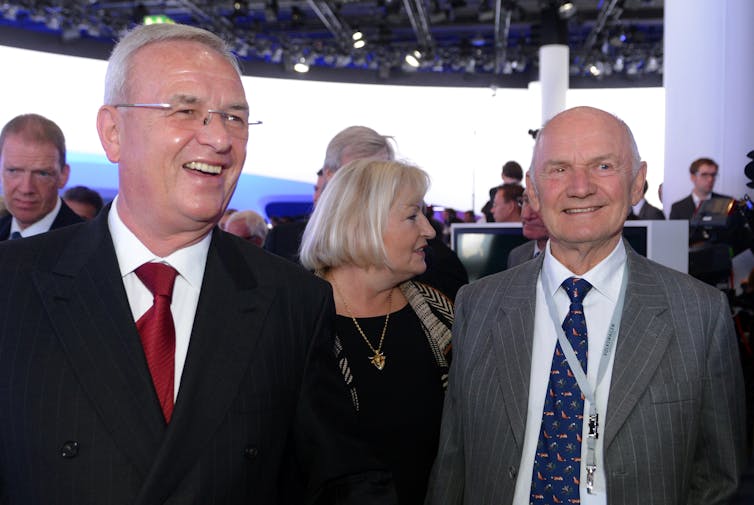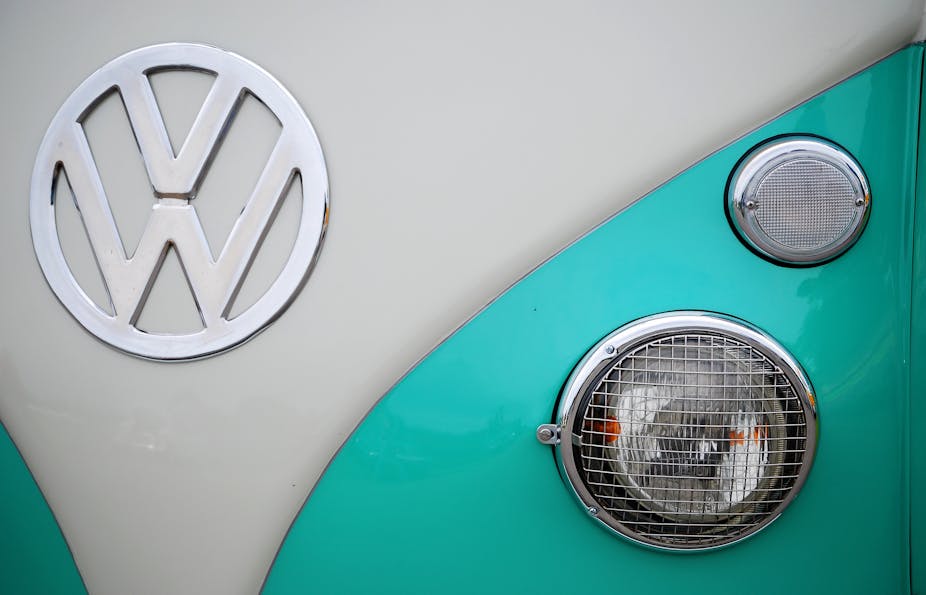I am distancing myself from Winterkorn.
With this short sentence, the powerful chairman of Volkswagen’s supervisory board, Ferdinand Piëch, expressed his misgivings about CEO Martin Winterkorn, who has led Europe’s largest car manufacturer to unprecedented heights since 2007.
Lobbed into the German media landscape out of the blue ten days ago, Piëch’s verdict exploded like a hand grenade. Frenzied coverage in national papers and TV bulletins soon came to the conclusion that, irrespective of his corporate achievements, Winterkorn would have to resign.
Equally soon, events proved them wrong. A week after Piëch had launched his attack, an emergency meeting of the supervisory board backed Winterkorn, promising to extend the CEO’s contract.
While this episode may appear as little more than a corporate power struggle, it sheds light on far broader issues. Indeed, the motives behind Piëch’s attempt to remove a successful CEO, the manner in which Winterkorn secured backing and the intense media interest highlight important aspects of Germany’s business culture.
Family ties
To some extent, the media focused on the conflict at VW because of the personalities involved. The expectation that Winterkorn would have to go reflected Piëch’s reputation as a ruthless power broker. In particular, the German public remembered how Piëch had fought off a hostile take-over bid from luxury car manufacturer Porsche in 2008. Initially standing with his back to the wall, he launched a determined counter attack that resulted in a gleeful public humiliation of Porsche’s management.

Many German observers were also aware that Piëch has an exceptionally personal and intriguing stake in VW. With other family members, Piëch owns a holding company that, in turn, controls the majority of VW’s shares. He owes this good fortune not only to an illustrious career that included success as a CEO at Audi and Volkswagen; he is also a member of one of Europe’s premier auto dynasties. Ferdinand Piëch’s grandfather was no other than Ferdinand Porsche, who designed the legendary Volkswagen Beetle in the 1930s and thus laid the foundation for today’s corporate giant. His uncle was Ferry Porsche, who established the eponymous sports car firm.
Its infighting has entertained the German public for years, not least during the aforementioned take-over bid of 2008, which – among other things – was a family spat writ large. While most global enterprises are clad in a largely anonymous aura, VW attracts unusual public attention because important company developments can be told as a family drama – in which Piëch plays the towering corporate patriarch.
Weather vane
At the same time, many Germans regard VW as far more than an over-sized family firm. It is Germany’s largest company by a considerable margin. In 2014, VW employed almost 600,000 people who worked in 118 factories in 31 countries. Moreover, the German public has long viewed Volkswagen as an enterprise whose fortunes are symbolic of wider national economic trends.

The company gained this cultural resonance during the so-called “economic miracle” of the 1950s and 1960s, when average incomes quadrupled. Then, VW embodied a country under dynamic reconstruction. Its best-known product – the Beetle – stood for an affordable consumer boom. VW’s workers received West Germany’s highest wages and most generous benefits, in part due to cooperative industrial relations between management and trade unions. While the economic miracle is a thing of the distant past, Volkswagen’s status as a national weather-vane of “Made in Germany” remains intact.
That is why the German public tried so hard to decipher what Piëch might have meant when he “distanced himself” from his CEO. In March, VW had presented impressive annual figures. Profits stood at €11 billion; most employees, including assembly line workers in Germany, received substantial bonuses. With its 10m cars sold that year, the firm was on track to become the world’s biggest auto maker. Just like the country itself, Volkswagen seemed to be in rude economic health.
Expansion pact
Given that, Piëch’s attack was widely read as impatience with longstanding problems that Winterkorn had failed to solve. In particular, the CEO had not expanded Volkswagen’s market share in the US, where the VW brand remains stuck in a tiny niche. Although the company posted impressive results in Asia, Winterkorn had not arrested falling sales in Brazil, which auto circles see as a crucial emerging market.

It is also probable that Piëch saw the need for a new approach to a key structural problem. You see, the group consists of brands ranging from high-end Lamborghinis to budget Skodas. Within this range, the Volkswagen brand (Golf, Passat, Polo etc.) is stuck between highly profitable luxury marques and the high-volume economy range. This awkward mid-market position has left the Volkswagen brand struggling to reach the profitability levels of other parts of the VW concern.
Piëch, commentators reasoned, wants to install a new CEO who makes VW’s core brand more profitable. That he did so at a time of good results showed him drawing on decades of experience to anticipate crises. Indeed, when Piëch was VW’s CEO in the mid-1990s, one of his main tasks had been boosting the core brand’s results.
Blessed union
The emphasis that German coverage placed on VW’s potential problems indicates that observers there are attuned to the tenuous nature of economic success, but still, the public had little sympathy for Piëch’s initiative. Indeed, the CEO emerged from the power struggle with the promise of an extended contract because the powerful trade union representatives, who make up half the members of VW’s supervisors boards, unanimously backed Winterkorn.
The message was clear: whoever wants change at a substantial German company needs to consult the trade unions first. Germany’s prosperous economic results (including substantial pay awards for large sections of the workforce) highlight that the country’s pervasive approach to industrial relations, which requires employers and trade unions to work together to resolve problems, may have a lot to recommend it. On this occasion, it shored up a CEO who is Germany’s highest-paid manager on about €15m.
To highlight their alliance, Winterkorn and the head of VW’s trade union sat next to each other during the Europa League match of VfL Wolfsburg, the club sponsored by VW. Neither of them looked too happy; Wolfsburg lost that first leg of the tie to SSC Napoli 1-4. Winterkorn may have had more than football on his mind. Immediately after the board meeting that saved his neck, commentators were predicting that Piëch was setting himself up for a second leg of his own.

